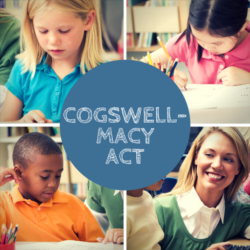Alice Cogswell and Anne Sullivan Macy Act
Named for the first deaf student to be formally educated in the U.S. and for Helen Keller’s beloved teacher, respectively, the Alice Cogswell and Anne Sullivan Macy Act will strengthen the Individuals with Disabilities Education Act to improve results for deaf, hard of hearing, blind, visually impaired, and deaf-blind children, including those with additional disabilities. Among other things, this Act will:
- Require states to identify, locate, and evaluate children who are deaf, hard of hearing, blind, visually impaired, or deaf-blind regardless of formal disability category or classification so that all of these students, including those with additional disabilities, are counted and properly served.
- Expand knowledge about the scope and quality of special education and related services provided to students who are deaf, hard of hearing, blind, visually impaired, or deaf-blind through refined data collection that tracks these students, regardless of formal disability category or classification.
- Expect states to conduct strategic planning, and commit such planning to writing, to guarantee that all deaf, hard of hearing, blind, visually impaired, and deaf-blind students within each state receive all specialized instruction and services needed, provided by properly trained personnel.
- Enhance existing “special factors” provisions to ensure that they provide for: deaf and hard of hearing children’s language and communication needs and other unique learning needs; blind and visually impaired children’s needs related to the Expanded Core Curriculum, the body of services which teachers of students with visual impairments and related professions are expertly trained to provide; deaf-blind students’ need for language, communication, access to environmental and educational information needed for learning and interaction, and other needs.
- Ramp up U.S. Department of Education responsibilities to monitor and report on states’ compliance with their obligations with respect to instruction and services specifically provided to students who are deaf, hard of hearing, blind, visually impaired, or deaf-blind.
- Assist parents and educators of students who are deaf, hard of hearing, blind, visually impaired, or deaf-blind through regular and up-to-date written policy guidance from the U.S. Department of Education.
- Improve educational outcomes for students who are deaf-blind by updating relevant terminology, including intervener services as a related service, and ensuring the availability of trained and qualified personnel.
- Establish a national collaborative organizational resource, the Anne Sullivan Macy Center on Vision Loss and Educational Excellence, to proliferate evidence-based practices in the education of students with vision loss, to keep special educators current with the latest instructional methods, and to supplement state and local educational agency provision of the instruction and services of the Expanded Core Curriculum.

